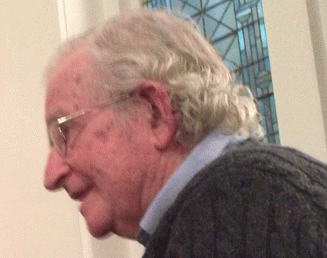The second half of my interview with world-renowned political activist, linguist, cognitive scientist, philosopher author, MIT Professor emeritus Noam Chomsky.
Here's a link to the first half of the interview.
Photo by Rob Kall
Thanks to Don Caldarazzo for help editing the transcript.
And here's the link to the audio podcast: Exclusive: Rob Kall Interviews Noam Chomsky: America in Decline, US Operating Procedures for Blocking Democracy
Rob: "Station ID (WNJC 1360 AM, the Rob Kall Bottom Up Radio Show)" My guest tonight is one I'm very excited to have back - he's a world renowned political activist, linguist, cognitive scientist, philosopher, author; he's MIT Professor Emeritus Noam Chomsky. Welcome to the show!
Rob: What
level do you think economics and marketing are at, compared to"
Noam: Not
even in the same ball park.
Rob: Are
you talking about pre-Copernican?
Noam: All.. Look, it's not a criticism. The reason why physics and chemistry make
significant progress is that they're dealing with artificially simple
systems. So physics makes huge progress,
because it really isn't dealing with what's going on in the outside world. Like, physicists don't take video tapes of
what's happening in the outside world and try to construct physics from
it. It's concerned with extremely simple
systems understood within the highly abstract context of sophisticated
experiments. And doing that, you can make
really enormous progress - tremendous intellectual achievements. But, if a physicist gets to, say, a molecule
that's too complicated, they hand it over to chemists. And if it becomes too complicated for the
chemists, they hand it over to the biologists, and if it's too complicated for
them, they hand it over to the historians or sociologists. And of course, as you move to higher and
higher levels of complexity, you (quite naturally) get less and less
fundamental understanding. That's almost
automatic. So it's not that deep
understanding is inconceivable, it's just going to be a lot harder. And when we talk about those issues of
unification that you were quoting in connection with the sciences, or the shift
from teaching engineering to teaching basic science, remember that's very recent,
after literally thousands of years of intensive study and progress.
Rob: And,
you know, you mention in that same article -- and frankly that article grabbed
me, because my first encounter with you was back in the early 70s as a
psychology major reading about psycholinguistics. And so I think of you, not just as an
activist, but of course as a scientist.
You mention in that article, and I quote, "At some point in human
evolution, and it's apparently pretty recent given the archeological record
(maybe the last hundred thousand years), a computational system emerged which
had new properties that other organisms didn't have, that has kind of
arithmetical type properties"" Now, you
were talking about language acquisition skills there, I think.
Noam: Yeah.
Rob: Right?
Noam: It's
language"go ahead, sorry.
Rob: Just to
wrap up the question; others have written about how small changes in language,
like the onset of writing, or the beginning of the Gutenberg press, have had --
like people like Leonard Shlain and Walter Ong - they've explored how these changes
have had major effects on how people function in our culture. I'm just curious; now we have the internet,
and with this it's massively changing things, I really think that it had a big
effect on the Occupy Wall Street Phenomenon.
I'm asking, so, we go from one hundred thousand years ago, a
computational system emerges, and arithmetical brain properties, and language,
and writing, and now we have the internet, and where do you see us all moving
with this as humans, so we don't kill
ourselves with our intelligence?
(Note: You can view every article as one long page if you sign up as an Advocate Member, or higher).






